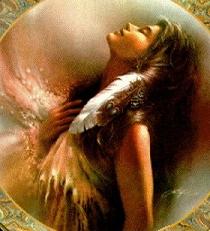Though the daughter of a King and a cursed Apsara (celestial dancer), the lady who was the root of the Mahabaratha was brought up as a fisherwoman. She used to ferry people across the Ganga river and catch fish for a living. So much so, she started smelling like a fish and people started calling her Matsyagandha (One who smells like a fish).
As a young woman, when she was ferrying sage Parashara across the river, the sage calculated the stars location and found that they were in very favourable positions and any child conceived at that time would be one with great wisdom. Being the only woman near by, he propositioned Satyavati. The frightened girl gave excuses after excuses but the sage resolved them all and gave her two boons as an additional lure to accept. Fearing the sage's anger, she saw no means but to accept. The boons she gained was that she would always be as sweet smelling as a garden of the sweetest smelling flowers (Gandhakalli) and that she would regain her original self (virgo intacto) after their child was born and so it was. This child was the one who grew up to write the Greatest Epic in the world. Vyasa!
A few years later King Shantanu, Father of Bheeshma, was moping on the shores of Ganges, missing his wife Ganga, when he saw the beauteous and sweet smelling Satyavati. Promptly forgetting his first wife, he set about luring the fisherwoman. But Satyavati's father was a bright man and wanted his grandchildren to rule over the kingdom. This was unacceptable to Shantanu as he already had a grown up and very eligible son.
But he was unable to forget his fisherwoman either and so he returned to his favorite pass time of moping and pining again.
Devavrata, the crown prince meanwhile getting to know of his father's angst, resolved to remain celibate and to always serve the person ascending the throne of Hastinapura, but to never ascend it himself. This was indeed a terrible oath, considering that those were times when celibacy was unheard of and kings had harems full of wives. The Devas very pleased with the oath named him Bheeshma and gave him a host of boons.
Coming back to our story, with the only barrier in his courting of Satyavati , Shantanu happily married her and they were blessed with 2 kids Chitrangada and Vichitravirya.
...
 Since Utanapada hardly spent any time with Suniti, Dhruv did not know his father well and was interested in hearing more about him all the time.
Since Utanapada hardly spent any time with Suniti, Dhruv did not know his father well and was interested in hearing more about him all the time.


